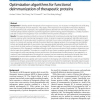Free Online Productivity Tools
i2Speak
i2Symbol
i2OCR
iTex2Img
iWeb2Print
iWeb2Shot
i2Type
iPdf2Split
iPdf2Merge
i2Bopomofo
i2Arabic
i2Style
i2Image
i2PDF
iLatex2Rtf
Sci2ools
103
Voted
BMCBI
2010
2010
Optimization algorithms for functional deimmunization of therapeutic proteins
Background: To develop protein therapeutics from exogenous sources, it is necessary to mitigate the risks of eliciting an anti-biotherapeutic immune response. A key aspect of the response is the recognition and surface display by antigen-presenting cells of epitopes, short peptide fragments derived from the foreign protein. Thus, developing minimal-epitope variants represents a powerful approach to deimmunizing protein therapeutics. Critically, mutations selected to reduce immunogenicity must not interfere with the protein's therapeutic activity. Results: This paper develops methods to improve the likelihood of simultaneously reducing the anti-biotherapeutic immune response while maintaining therapeutic activity. A dynamic programming approach identifies optimal and near-optimal sets of conservative point mutations to minimize the occurrence of predicted T-cell epitopes in a target protein. In contrast with existing methods, those described here integrate analysis of immunogenici...
Related Content
| Added | 08 Dec 2010 |
| Updated | 08 Dec 2010 |
| Type | Journal |
| Year | 2010 |
| Where | BMCBI |
| Authors | Andrew S. Parker, Wei Zheng, Karl E. Griswold, Chris Bailey-Kellogg |
Comments (0)

